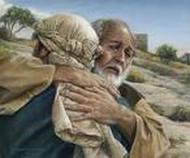Cultural Insights
in the Prodigal Son ~ Luke 15.1-3

Decades of life and ministry in the Middle East and a lifelong fascination with the
parable of the Prodigal Son have combined to give Kenneth Bailey a unique perspective
on the parable. We find his insights in several excellent books:
Kenneth E. Bailey, The Cross & the Prodigal, IVP, 1973, 2005.
_______________, Finding the Lost, 1992.
_______________, Jacob and the Prodigal, 2003
Two of Bailey's basic convictions are found in the following statements:
1) “The culture of the speaker must be penetrated if what is said is to be understood. Even so with the life and
teachings of Jesus.” (The Cross & the Prodigal, 11)
2) "Middle Eastern culture was a better lens through which to examine the parables of Jesus than my inherited
contemporary American culture.” (The Cross & the Prodigal, 11)
Reading Assignment ~ Read The Cross & the Prodigal, pages 26-89.
Luke 15.1-3
1) Read Luke 15.1-3, the historical setting for the parable of the Prodigal Son, carefully.
2) Look over the following questions:
1) Who cares that Jesus was on his way to Jerusalem?
2) Why were the Pharisees and scribes so quick to criticize Jesus and Jesus to confront them.
3) What did they mean by the term "sinners"?
4) Why did they associate tax collectors with "sinners"?
5) What was so wrong with "receiving" those people?
6) Who cares that Jesus was "eating" with them?
7) What did they mean by "sinners"?
3) Consider insights you have gained from your reading assignment that speak to these questions and help us
understand the cultural setting of the situation in which Jesus told the parable of the Prodigal Son.
4) Double-check your memory by reading through the answers/insights found at this link.
STEPPING OUT ~ Compose a 200-250 word devotional based on one insight you have gained into the cultural
context of the setting of the parable of the Prodigal Son.
parable of the Prodigal Son have combined to give Kenneth Bailey a unique perspective
on the parable. We find his insights in several excellent books:
Kenneth E. Bailey, The Cross & the Prodigal, IVP, 1973, 2005.
_______________, Finding the Lost, 1992.
_______________, Jacob and the Prodigal, 2003
Two of Bailey's basic convictions are found in the following statements:
1) “The culture of the speaker must be penetrated if what is said is to be understood. Even so with the life and
teachings of Jesus.” (The Cross & the Prodigal, 11)
2) "Middle Eastern culture was a better lens through which to examine the parables of Jesus than my inherited
contemporary American culture.” (The Cross & the Prodigal, 11)
Reading Assignment ~ Read The Cross & the Prodigal, pages 26-89.
Luke 15.1-3
1) Read Luke 15.1-3, the historical setting for the parable of the Prodigal Son, carefully.
2) Look over the following questions:
1) Who cares that Jesus was on his way to Jerusalem?
2) Why were the Pharisees and scribes so quick to criticize Jesus and Jesus to confront them.
3) What did they mean by the term "sinners"?
4) Why did they associate tax collectors with "sinners"?
5) What was so wrong with "receiving" those people?
6) Who cares that Jesus was "eating" with them?
7) What did they mean by "sinners"?
3) Consider insights you have gained from your reading assignment that speak to these questions and help us
understand the cultural setting of the situation in which Jesus told the parable of the Prodigal Son.
4) Double-check your memory by reading through the answers/insights found at this link.
STEPPING OUT ~ Compose a 200-250 word devotional based on one insight you have gained into the cultural
context of the setting of the parable of the Prodigal Son.
